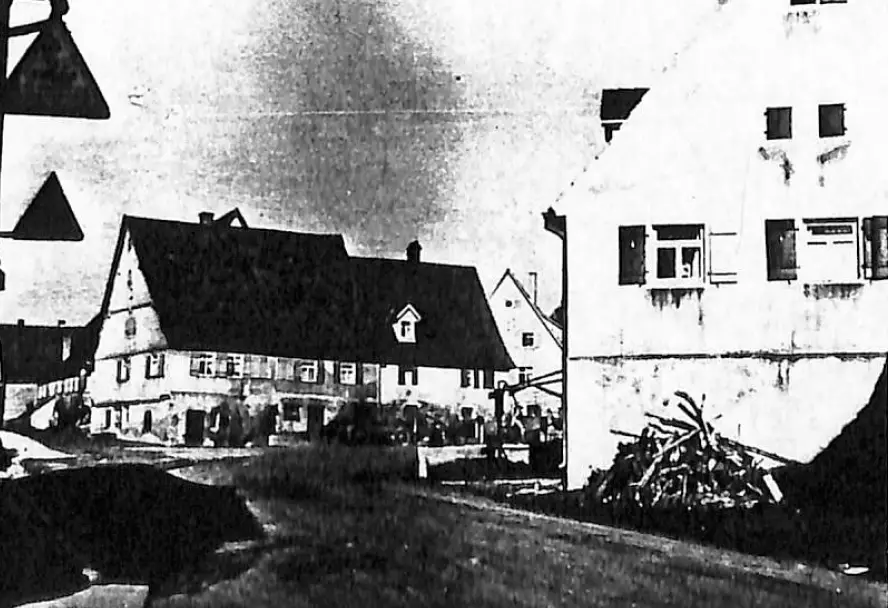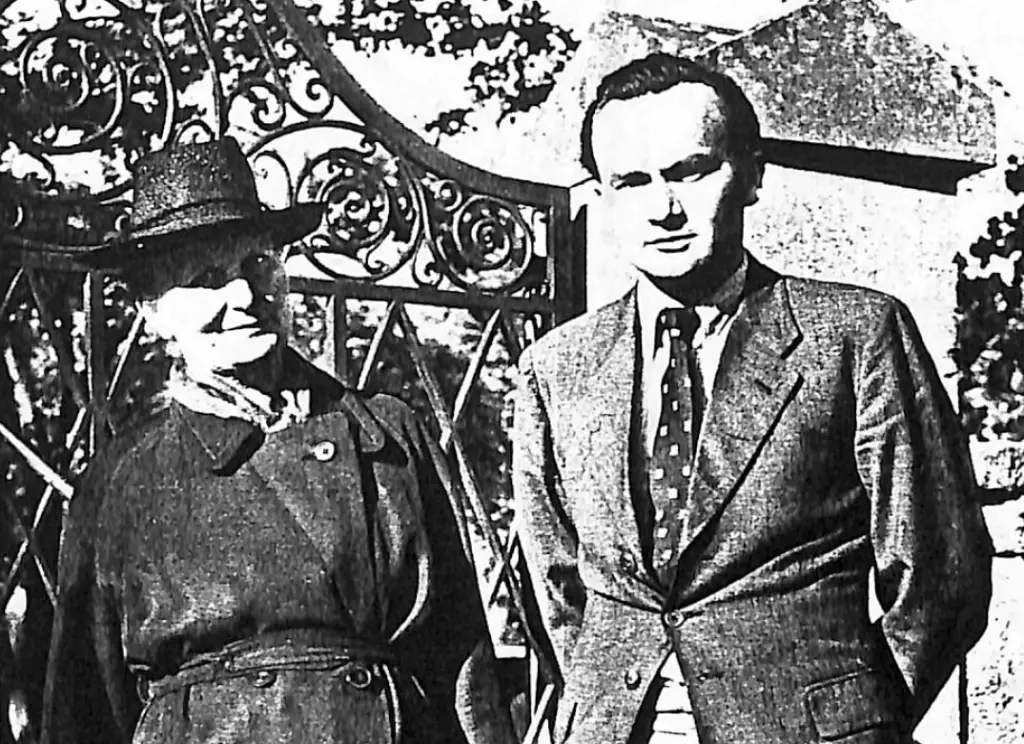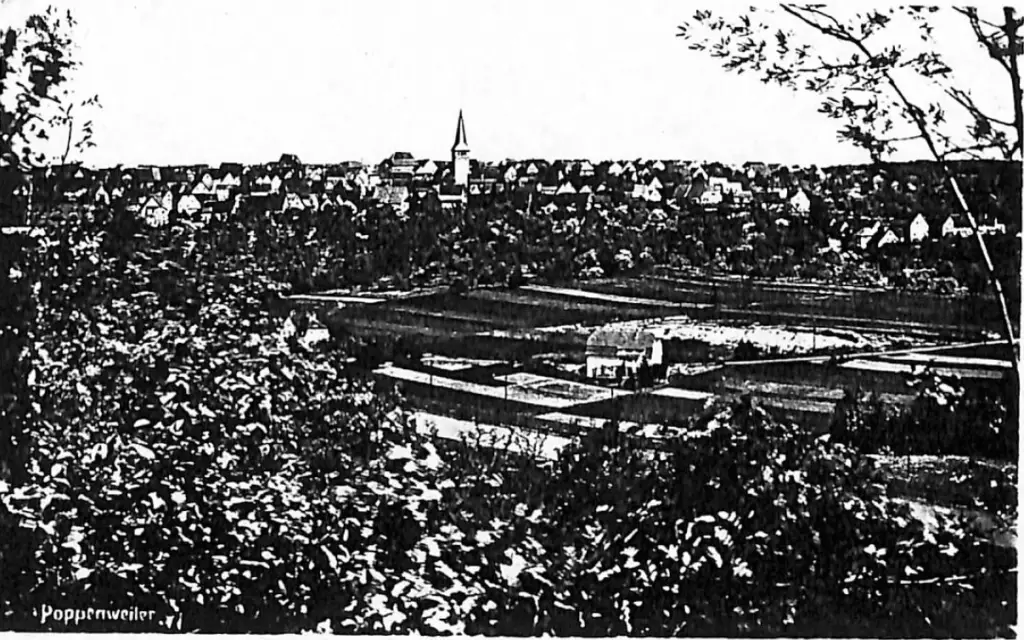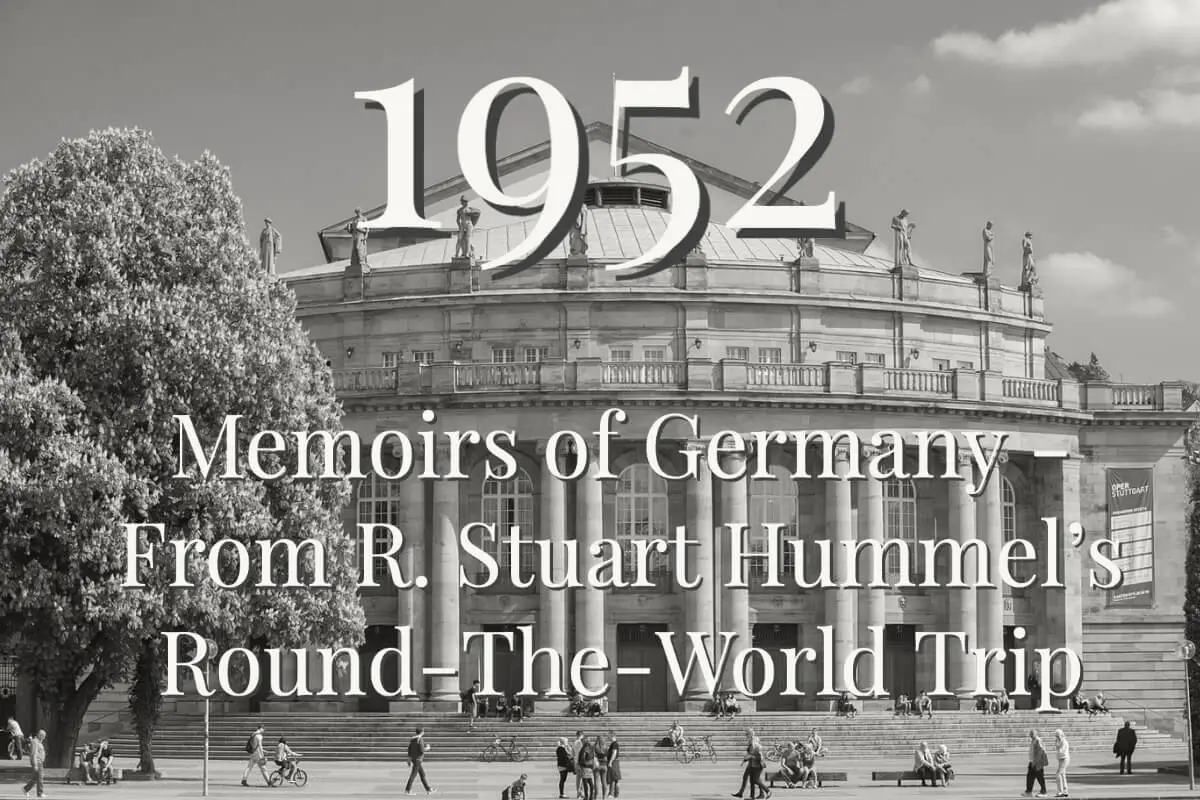My dad’s cousin R Stuart Hummel (1915-2007) worked for the U.S. Government. He was also a great historian who kept many of his own records plus our family’s records. These records are now part of the Stanford University Collection.
1n 1952, R. Stuart Hummel was on a trip around-the-world for the U.S. State Department; he kept detailed records of many of his meetings and interesting people he met along the way. This letter is from his time in Germany when he had the chance to see the first performance of the Boston Symphony in Germany, travel to the Soviet-side of Berlin, and give many impressions of Germany and his meeting of long-lost German family relations; his writing is a history of Germany in 1952 as seen through the eyes of a visiting American diplomat.
Table of Contents
- R. Stuart Hummel’s Letter to His Wife Kitty (Ella Kathleen Merrett) Hummel, From Germany in 1952
- Related Questions
His letters left us a great legacy of what Germany was like in 1952, when he visited Frankfurt, Poppenwelier, Ludswigburg, Stuttgart, and Berlin. The U.S. State Department ICS he refers to in his letter is the Information Center Service.
In 1953 President Dwight D Eisenhower moved all these departments to be under the USIA, the United States Information Agency. During this time, R. Stuart Hummel was working with ICS and the State Department. But he also worked as a cryptographer for the Navy during World War II and for the U.S. government in the Office of Chinese Affairs and the Office of Civil Defense.

I have left his letter in its entirety and have not cut out any part from the original letter. The photos are also photographs from his collection and this trip to Germany.
R. Stuart Hummel’s Letter to His Wife Kitty (Ella Kathleen Merrett) Hummel, From Germany in 1952
The Foreign Service Of the United States of America
Frankfurt, Germany, May 18, 1952
My Darling Kitty:
It is 3:30 PM, and I am in my room in the Carleton Hotel, an army billet in Frankfurt, Germany. In a few hours, I shall be flying on to Brussels, living this beautiful and fascinating area of western Germany behind. I plan to spend the night in Brussels and leave tomorrow afternoon for Paris. I expect to spend until the evening of the 21st in Paris, and then fly to London, where I plan to be until the evening of the 23rd unless I find something of special Interest there that prompts me to remain a day or two longer. I am booked to leave London on the 23rd at 5 PM and arriving in New York on the 24th.
To my surprise, Mr. Humphrey, newly appointed Deputy Assistant Administrator for the ICS (Information Center Service), turned up here in Frankfurt the other day. I mentioned to him my intention of wiring Simpson of ICS to ask If I could proceed directly to Los Angeles and then report for duty. He said he knew Sampson would want me to return to Washington as soon as possible I suggested that I go there to Washington for a few days and then take leave to go to Los Angeles. I’m thinking it over, I believe there may be a lot of merit in my going first to Washington. I could put my face in there on schedule and do any necessary reporting while the impressions are still fresh in my mind. At the same time, I can find out firsthand what changes have taken place in ICS since my departure – something I am eager to determine. I spoke briefly with Humphrey about it, but he was not very enlightening, probably because everybody is still groping in the dark over the whole thing. After showing up in Washington for say a week, I probably could leave with a clear conscience and without having to think further about reporting on my trip. Maybe I can take a little more time off or leave. Then there is the advantage of allowing Anne to remain in her school until a little closer to the end of the semester. In short, I shall plan to go to Washington first.
I’m awfully eager to be with you again, sweetie. It has been a terribly long time that we have been separated. I think of you all the time and wish I were with you. There are a constant ache and longing in my heart to be with you, but I can only repress the desire. There have been many times when I have been tempted to cut my trip short and get on to home quickly, but when I have considered the fact that this is an opportunity of a lifetime that I should not lose, I just grit my teeth and bear it. Of course, I am enjoying every new experience immensely, and I’m extremely thankful that I have had this wonderful opportunity. It is really amazing that I should have been permitted to spend six full months just traveling around the world, going literally anywhere I have wanted to go, and staying as long in each place as I have wanted to stay. Of course, it would have been much more enjoyable if you had been along. How I have wished you were with me over and over again, to enjoy the thousand and one experiences that I have been privileged to enjoy, and so that I could be close to you at all times.
Leaving Rome on the 8th, after a wonderful five days in that wonderful city with such a fascinating history, I flew to Munich and southern Germany (in the region known as Bavaria). The flight to Munich was wonderful because we flew over the Swiss Alps. From the plane, I took pictures of the snow-covered Swiss Alps below. Here and there was a beautiful lake, in the green valleys were red-roof houses. It is a mighty picturesque part of Europe.
From Munich, I worked my way by car and train north to Frankfurt, where I spent most of the time. I spent two days in Munich, driving to Augsburg and back to Munich. Then I took a train to Nurnberg, the spot where the famous Nurnberg trials were held. From there I drove to Erlangen and back. From Nurnberg, I took a train to the Schwabish Hall, where I spent a very enjoyable day with Walt and Laura Jenkins, and Sally-bet. Walt is finishing up a tour of duty as a resident officer in a beautiful little mountain town. Walt drove me around town and he, Laura, and I took a very pleasant walk around the hillside. I had a delicious chicken dinner with them. That evening I went by car with Walt to Stuttgart. Walt took a train from there to Bonn, to the north, while I stayed two days in Stuttgart.

I had a state department car from Stuttgart that drove me out to Ludwigsburg where the Sailer family lives. They are distant relatives on my dad’s side. I spent a very enjoyable two hours and more with Mrs. Sailer and her son. Perhaps you saw their daughter, Heidi when she visited mother and dad in Los Angeles. They were very nice people living in an attractive two-story house which they are sharing with some refugees. People all over Germany have had to take in refugees because of the great destruction the homes everywhere during the war. Also, Mrs. Sailer’s mother was there. She is a fine old lady of 81.
Mrs. Sailer and her son took me to the little town of Poppenweiler about ten minutes drive from Ludwigsburg. It was there that dad’s great grandfather or great-great-grandfather was born, build his house and a church (he was a builder), and raised his family. And it was there that he and members of his family are buried. His name was Strecker. I believe Mrs. Sailer said that his daughter Mary married a Hummel. Another daughter of his is the line from which Mrs. Sailer comes. I believe this Mary Hummel was the mother of dad and uncle Arthur’s father. That would make the Strecker’s dad’s great-great-grandfather and great-great-grandmother. Dad will probably know for sure what the connection is. Anyway, Mrs. Sailer and her son were perfectly charming people – very well mannered and very intelligent and most hospitable. I took pictures of them and the tombstones in the cemetery and other landmarks which the folks will be interested in seeing. I discovered after taking a roll of eight pictures, however, that I had overexposed the entire roll because I had forgotten that I had a more sensitive film in the camera and put the adjustments for a less sensitive film. I believe they will come out, however.

Well, nearby Poppenweiller is the birthplace of the German Shakespeare – Friedrich Schiller. We went there and saw his birthplace, now a museum, and went through the Schiller museum, a large building where are preserved copies of his writings, many busts, and pictures of him as well as his writings, pictures, etc., of the other great poets of the Wurttemberg-Baden area. There are many famous poets from that area.
After two days in and about Stuttgart, I took a train to Heidelberg, the famous University city. From there I was driven by car some 10 miles to Mannheim and then back to Heidelberg, from which city I went by car that same evening to Frankfurt.
I was very fortunate to have been offered a ticket to the Boston Symphony Orchestra’s first performance in Germany that same night, the 13th. It was held here in Frankfurt in the opera house. It was a fine performance and made a terrific hit with the Germans, who will go nuts over music. Many of them would rather go without a meal than go without their symphony orchestra. They are all wrapped up in it.
The Boston Symphony Orchestra has as guest conductor Pierre Monteux, the famous French conductor. The regular conductor or director was sitting on the balcony just across the aisle from me. His name is Munch. Monteux did a fine job and got lots of applause after each number.
After the symphony, I was one of a relatively small group of guests at a reception for Monteux and the other big shots. I shook hands with Monteux and with Mrs. McCloy, the wife of General McCloy who is the High Commissioner for West Germany, the American zone. General McCloy was unable to attend.
I drove out to Wiesbaden, a city some 35 or 40 miles from Frankfurt, to visit the Amerika Haus (Information Center), and from there drove out to Haus Schwalbach but close to the Rhine River, where a youth training program is being conducted at a wonderful estate up on the hill surrounded by forests and green fields. On the way back we stopped for dinner along the Rhine. From the café eating out in the open, we could see the long barges going up the Rhine – a beautiful site.
I was invited to be present at a cocktail party that evening, the 15th but I did not go as it was rather late when I got back to Frankfurt.
On the 16th, I spent the entire day at a conference of all public affairs officers here in Germany. It was the day that they discuss the cultural side of the program. The time was very profitably spent. It was fortunate and coincidental timing that enabled me to be here for this conference.
The evening of the 16th, I took a train for Berlin after an all-night ride mostly through Soviet-controlled territory, we arrived in the Western Sector of Berlin which is under American, British, and French control. It was a twelve-hour train trip. Yesterday, the 17th, I spent one of the most interesting and unusual days I have spent on this trip. The Director of the Amerika Haus, Christopher A, Legge, drove me all over Berlin. We were all over the Eastern Sector which is controlled by the Soviets. That was a real experience indeed. There are some marked contrasts between the east and the west. All over the Eastern Sector are statues and pictures and banners of Stalin. And flags are seen up and down Unter den Linden and other streets. We went inside the Soviet Hall of Culture, the counterpart of our Amerika Haus. That was an experience! I was quite surprised to find that we could go into the Soviet-controlled sector so easily. I took many pictures.

Before closing, I should say something about the conditions that one finds here in Germany. The cities have been virtually leveled to the ground by bombs and fire during the war. Everywhere one sees rubble, fragments of walls and roofs, twisted iron beans – destruction everywhere. Considerable progress has been made and rebuilding many of the buildings, and parks and gardens have been pretty well redone, but wherever the eyes look there are bombed and burned-out buildings. Berlin is particularly bad. There are blocks and blocks of just debris and what’s left a former mansion, churches, monuments, houses, castles, and what have you. It is readily apparent that all of these German cities were beautiful places before their destruction. Trees are everywhere. There remains enough of the cities to show that life in Germany must have been wonderful before the war. At least the cities were beautiful.
The countryside is the most beautiful I have ever seen – miles upon miles of solid green vegetation. Vegetables, fruit trees, grains, and all kinds of other vegetation can be seen as far as the eye goes. The government has a fine policy on keeping forests, so there are beautiful forests everywhere, too. I have seen an awful lot of Germany during my eleven days here, and nowhere have I seen open country that is not covered with green vegetation.

Another interesting sight is the small towns that are scattered all over the land, nestled and valleys. Every few miles there is a town with a few hundred or a few thousand people living in it. These towns are very neat and clean. The houses are well-kept. There is a lot that some parts of our country could learn from these people when it comes to caring for their homes.
Well, KItty this letter has gotten awfully long. I saw stop now. I may be dropping you another letter from Paris and London.
The last letter received from you was a Calcutta, I believe if you address letters to Rome, Munich, or Frankford they have not turned up. I did not stop off at Karachi but dropped a note to the Embassy there asking that they send to London any mail that arrived there for me. I’ve been hoping to hear from you about an American Pad and Paper. I’m wondering whether they sold my bookrests and if there were any royalties. Maybe there will be something from you in Paris and London. I got a nice letter from Dad the other day, in which he said you, Ann and Billy-the-kid visited them about once a week, or oftener, which pleases them greatly.
Love and kisses to my angel,
Stuart (Hummel)
P.S. I am bringing some dolls for Ann. As it won’t be possible for me to write a detailed letter on my German travels to the folks, would you mind reading sections to them or, if you don’t mind, letting them read the letter?
When typing this letter from R. Stuart Hummel, I decided I should include the entire letter – even his P.S. section at the bottom. I felt like the letter showed about the world in 1952 and a bit about the personality and life of R. Stuart Hummel. He has given us a glimpse into what it was like for him to be on an around-the-world tour without access to the internet, phone, or other ways of communication. I also really love his memoirs of Germany – especially the Berlin area.
I did not realize that in 1952, seven years after World War II ended that Germany was still in rubble in many places. So much so that many Germans had refugee families still living with them. History teaches us how devastating war is and how long it can take a country to recover.
This letter will be the first in a series of other letters that we will write and record on this blog from R. Stuart Hummels around the world trip in 1952 and his other life observations. If you have any questions about the R Stuart Hummel collection or would like to know more about him you are welcome to contact me, Anita Hummel, by clicking here.
Related Questions
What Is The History Of The Kingdom of Württemberg – Germany?
The Kingdom of Württemberg existed from 1805 to 1918. The Kingdom had four different Kings. Though the Kingdom of Württemberg is now part of present-day Germany, during its existence the alliances of the Kingdom changed. The last King of Württemberg was forced to abdicate in 1918.
You can read more by reading A History of The Kingdom of Württemberg – Germany by clicking here.
What Is The History of Westphalia, Germany?
Westphalia’s history goes back to the times of the ancient Saxons. For a period of time, Westphalia was under the rule of Napoleon and the French. Later Westphalia became a state of Prussia until it officially became part of Germany in 1945.
You can learn more by reading A History of Westphalia, Germany by clicking here.
